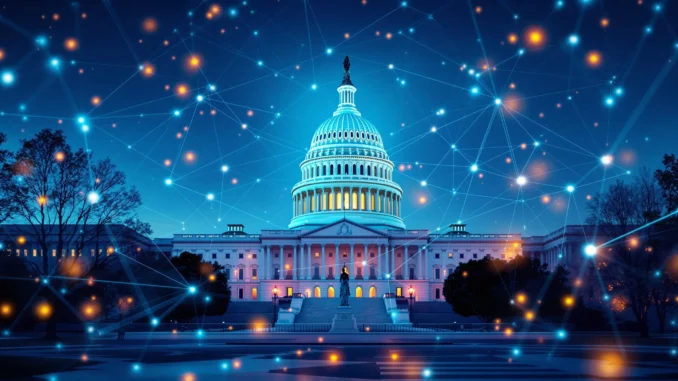
Exciting news for the crypto community! In a significant development, the U.S. House Ways and Means Committee has just taken a major step that could reshape the future of decentralized finance (DeFi) in the United States. Are you ready to dive into the details of this potential game-changer? Let’s break down how this move to repeal the IRS’s DeFi tax rule could be a victory for innovation and what it means for you.
What’s Happening with the IRS and the DeFi Tax Rule?
The heart of the matter lies in a recent decision by the U.S. House Ways and Means Committee. In a vote of 26-16, they decided to advance a resolution aimed at reversing a controversial tax rule issued by the IRS in December. This rule has sent ripples through the crypto world, particularly within the decentralized finance sector. But why is this rule so problematic, and why is its potential repeal such a big deal?
Why is the DeFi Tax Rule Causing a Stir?
The crypto industry argues that the IRS DeFi tax rule fundamentally misunderstands how decentralized finance protocols operate. The core issue is the classification of DeFi protocols as ‘brokers’. Here’s why this misclassification is so disruptive:
- Misinterpretation of DeFi Functionality: DeFi protocols are designed to be decentralized and non-custodial. They are not traditional financial intermediaries. Treating them as brokers creates immense compliance burdens.
- Stifling Innovation: Classifying DeFi protocols as brokers imposes broker-dealer reporting requirements. This could force many innovative DeFi projects to shut down or move offshore, hindering the growth of the sector in the U.S.
- Practical Implementation Nightmares: The technical requirements for reporting under the broker definition are practically impossible for many DeFi protocols to implement due to their decentralized nature.
Essentially, the industry believes the IRS rule is a square peg in a round hole – forcing a traditional financial framework onto a fundamentally different technological paradigm.
The Congressional Review Act: A Powerful Tool for Change
The resolution to repeal the DeFi tax rule is being introduced under the Congressional Review Act (CRA). What is the CRA, and why is it significant in this context?
The Congressional Review Act is a law that allows Congress to review and, by passing a joint resolution of disapproval, overrule certain federal agency rules. It’s a powerful tool, but it’s also not frequently successful. Here’s why using the CRA is a strategic move:
- Expedited Process: The CRA provides for expedited consideration in the Senate, making it potentially faster than other legislative routes.
- Simple Majority: Resolutions under the CRA require only a simple majority vote in both the House and Senate, rather than the 60 votes often needed to overcome a Senate filibuster.
- Direct Challenge: It directly challenges the IRS rule, forcing a clear up-or-down vote on its validity.
The fact that the House Committee is using the CRA signals the seriousness with which they are taking the industry’s concerns about the DeFi regulation.
What are the Next Steps in Repealing the DeFi Tax Rule?
While the House Committee vote is a positive first step, the journey to repeal the IRS DeFi tax rule is far from over. Here’s what needs to happen next:
- Full House Vote: The resolution now moves to the full House of Representatives for a vote. Given the bipartisan concerns around crypto regulation, there is optimism it could pass.
- Senate Approval: Even if it passes the House, the resolution must then be approved by the Senate. Senator Ted Cruz has already introduced a Senate version, which is a positive sign, but Senate passage is never guaranteed.
- Presidential Signature (or Veto Override): Finally, even if both houses of Congress approve the resolution, it would need either a presidential signature to become law or a veto-proof majority in both houses to override a potential presidential veto.
It’s a multi-stage process, and each step presents potential hurdles. However, the momentum is building, and the crypto industry is actively lobbying for the repeal.
The Potential Economic Impact: $3.9 Billion at Stake?
Interestingly, the article mentions that the IRS rule, if repealed, would reduce U.S. tax revenue by an estimated $3.9 billion over the next decade, according to CoinDesk reports. This figure raises some important questions:
| Perspective | Implication of Repeal (Revenue Impact) |
|---|---|
| Government (IRS) | Potential loss of $3.9 billion in tax revenue over 10 years. This might strengthen the argument against repeal from a fiscal standpoint. |
| Crypto Industry | Avoidance of stifling regulations that could cripple the DeFi sector. Potential for continued growth and innovation, which could generate other forms of tax revenue in the long run (e.g., capital gains, income from related businesses). |
| Taxpayers/Users of DeFi | Potentially less complex tax reporting in the short term. Long-term benefit from a thriving and innovative DeFi ecosystem. |
While a $3.9 billion figure sounds significant, it’s crucial to consider the broader economic implications. Restricting DeFi innovation could have far-reaching negative consequences, potentially dwarfing the short-term tax revenue gain. The debate is about balancing immediate revenue with long-term economic growth and technological advancement.
Is This a Victory for Crypto?
The House Committee’s move is undoubtedly a huge win for DeFi and the broader crypto industry. It signals that lawmakers are starting to understand the nuances of this technology and the potential harm of overly broad regulations. However, it’s crucial to remember that this is just one step in a long process.
Key Takeaways:
- The House Committee’s vote is a significant positive development in the fight against burdensome crypto tax regulations.
- Repealing the IRS DeFi tax rule could unlock further innovation and growth in the DeFi sector.
- The process is not yet complete, and continued advocacy and engagement are crucial to ensure the resolution becomes law.
Stay Tuned for Updates!
The situation surrounding the DeFi regulation and the IRS tax rule is rapidly evolving. Keep following our updates as this story unfolds. This is a critical moment for the future of decentralized finance in the U.S., and your voice and awareness are essential!



